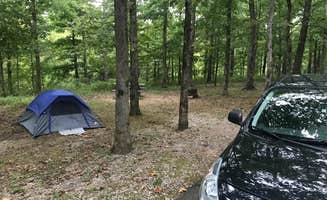Primitive camping near White Bluff, Tennessee offers several options for overnight stays within the Cumberland Plateau region. The area features limestone formations, hardwood forests, and elevation changes of 300-800 feet above the surrounding countryside. Most camping areas remain open year-round, though winter temperatures can drop below freezing from December through February, making adequate cold-weather gear essential for off-season camping.
What to do
Hiking natural waterfalls: At Meriwether Lewis Campground, trails lead to scenic water features. "Pretty water falls not far from the camp site. History and adventure!" notes Brittni F. The trail system provides varying difficulty levels suitable for different skill levels.
Historical exploration: Learn about the famous explorer at the monument and cabin replica. "There was stuff about Meriwether Lewis, like the cabin he died in (weird I know, but kinda cool, right?!)" shares Jessica L. The interpretive displays provide context about the Natchez Trace's significance as a historic travel route.
Island adventure: For water enthusiasts, Goose Island on J. Percy Priest Lake offers a unique primitive camping experience. "This is a really great place to camp if you have a way to boat out to the island. We use a canoe since it's only a quarter mile or so paddle," explains Brandon.
What campers like
Clean facilities: Meriwether Lewis Campground maintains exceptional standards despite being free. "This place is a gem! Free water in various places, garbage cans by your site, numbered sites, paved driveways and parking spaces, manicured and litter-controlled park, and a bathroom building with multiple flush toilets for each sex and sinks with running water!" reports Lara M.
Peace and quiet: The secluded nature of sites provides tranquility. "As busy as it was I still found a quiet spot. Level pads, table and fire ring at all the sites," notes David R. about Meriwether Lewis Campground. The campground layout helps maintain a sense of solitude even when sites are occupied.
Night sky viewing: Rural locations offer minimal light pollution for stargazing. "I got in late last night and the road to get there was majestic under the stars," shares Seanna M. The dark skies provide excellent conditions for astronomy enthusiasts.
What you should know
Navigation challenges: Trail markings can be confusing at some locations. "Careful on the hiking trails though, many cross paths with no directions on how to get back to camp. We wondered around for a few hours before making it out," warns Ashley R. about Meriwether Lewis Campground.
Limited amenities: Most primitive camping sites near White Bluff have basic facilities. "Good bathhouse with flush toilets and cold water sink. No Shower. Great for tent camping," explains Anita C. Campers should prepare for minimal services.
Wildlife encounters: Local wildlife may approach campsites. "The only down side (at least when we were there) is the raccoons. They will come up really close at night begging for food. They're harmless though," reports Brandon about Goose Island. Proper food storage is essential.
Tips for camping with families
Multi-age appropriate trails: Family-friendly hiking options accommodate various ability levels. "Trails to hike that are challenging but not too hard for kids of multiple ages," suggests Brittni F. about Meriwether Lewis Campground.
Educational opportunities: Historical sites provide learning experiences for children. The interpretive displays about Meriwether Lewis offer educational value for school-age children interested in exploration history.
Site selection for privacy: Choose sites with natural barriers for family comfort. "Spots have some space between them but sparse trees for separation," notes Tiel M. This helps maintain privacy between camping groups.
Tips from RVers
Parking accessibility: Concrete pads facilitate easier setup for recreational vehicles. "There are many concrete parking spots for RVs and spots for camping. The parking spot also has a Littering box and a table," explains Len L. about Meriwether Lewis Campground.
Stay duration limits: Free camping areas have restrictions on length of stay. "You can stay for 14 days each year because, let's face it, it's too nice for them to let people hog it," mentions Lara M. Plan accordingly for your trip length.
Backcountry feel with RV access: Some sites offer remote atmosphere with vehicle convenience. "I like campgrounds that kind of feel like you are in the backcountry and this is exactly what this felt like!" shares Jessica L. The campground provides primitive camping sensibility with road access.


